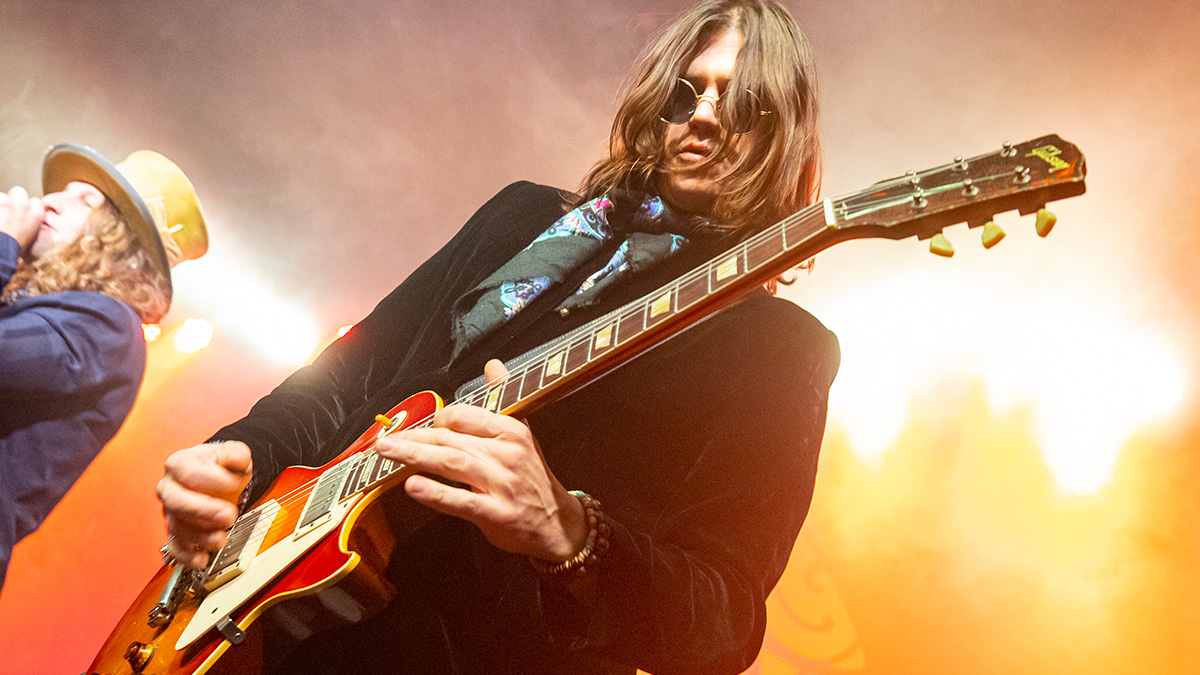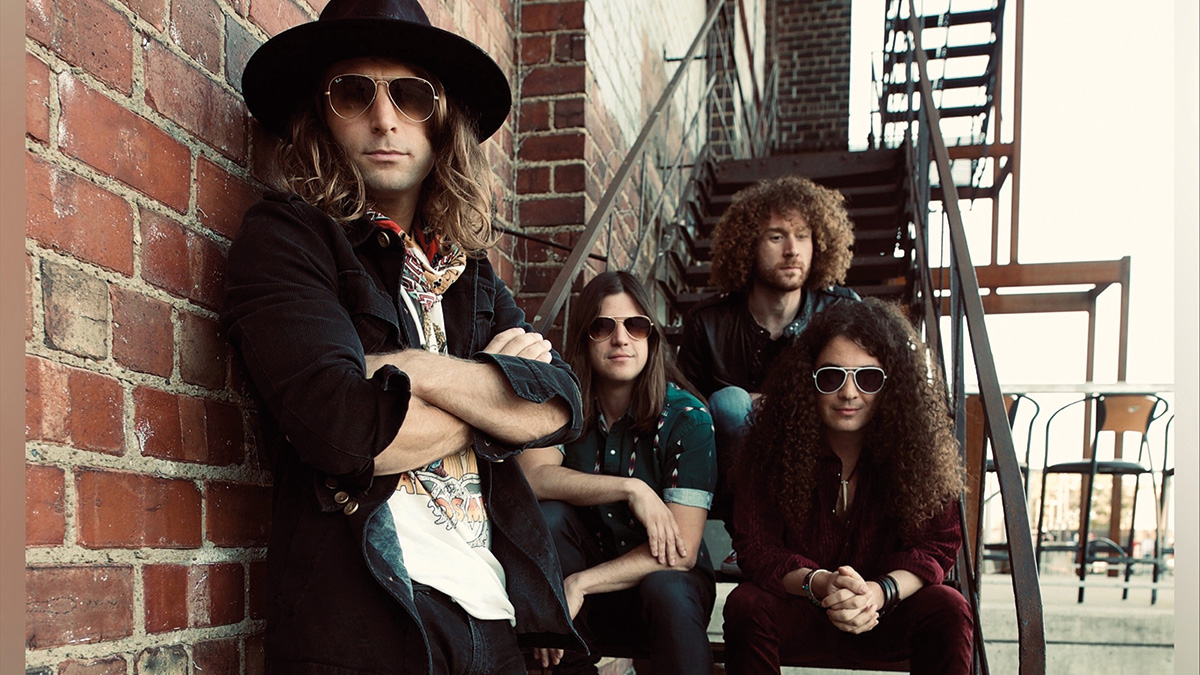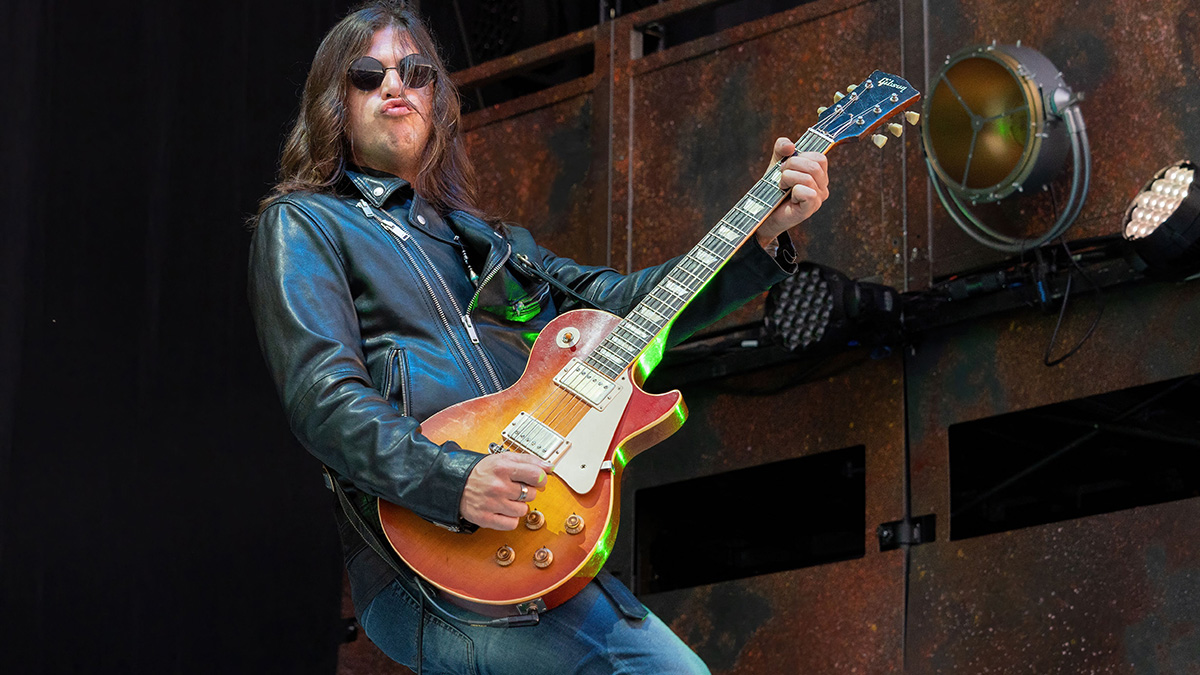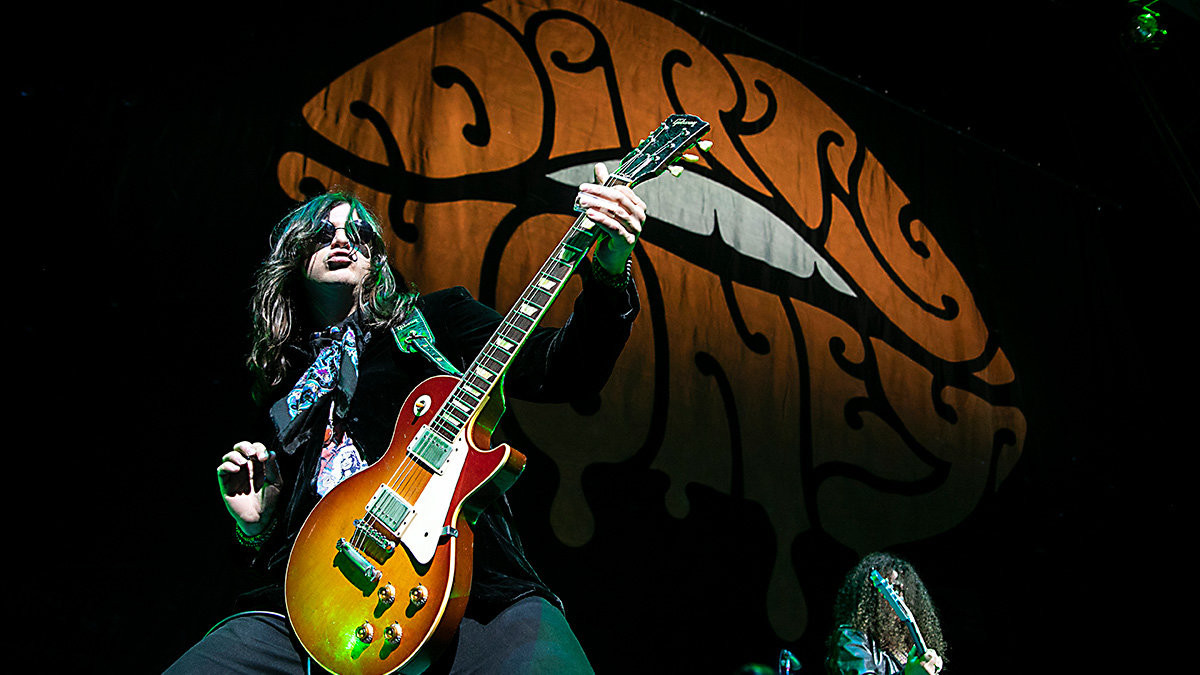Dirty Honey's John Notto: “There was no doubt I was going to succeed as a guitarist... failure just wasn’t an option”

John Notto doesn’t have much use for modesty. “There was no doubt I was going to succeed as a guitarist, and I knew this band would go over,” he says. “I know that sounds bold, but for me, failure just wasn’t an option.”
Thus far, Notto has stats to back up his claims: Back in 2019, the Los Angeles-based quartet released their self-titled debut EP and became the first unsigned band to top Billboard’s Mainstream Rock Songs chart with their riff-o-rama knockout single, When I’m Gone. Soon after, they hit Number 3 on the same chart with the swaggering follow-up, Rolling 7s.
Packing a sound that neatly blended the most exuberant elements of Led Zeppelin, Aerosmith and AC/DC, the band quickly found their services in high demand and were opening shows for the likes of the Who, Guns N’ Roses, Slash and Alter Bridge.
“A lot of bands would say, ‘Oh, no, we should start small,’ but we never felt like we weren’t ready,” Notto says.
“The Slash dates were the first ones our manager booked for us, and that was a real sign of how much he believed in our band. I think he saw right away how far we could go, and we were right on board. So when those other tours were presented to us, it was like, ‘You want us to jump high? We can jump even higher.’ We try to outdo each task as it comes, and we rise to every occasion.”
Dirty Honey came together in 2017, when Notto, a Massachusetts native who grew up in Maine, headed to L.A. in the hopes of putting together an outfit that combined his love of classic rock and funk. He hooked up with singer Marc LaBelle, and for a brief period the two played in a band called Ground Zero before they met up with bassist Justin Smolian and drummer Corey Coverstone to form Dirty Honey.
From the beginning, Notto was insistent that he’d be the band’s sole guitarist, describing his role thusly: “I think of myself as a Slash or Angus if they were in the position Eddie Van Halen was in where you don’t have a rhythm guitarist to hold down the fort. I am the fort. I try to wear as many hats as possible, but it really comes down to the riffs. I want them to be as memorable as the choruses, but I want them to stand all by themselves without anybody backing me up.”
Get The Pick Newsletter
All the latest guitar news, interviews, lessons, reviews, deals and more, direct to your inbox!

Forced off the road due to the pandemic, the band faced a unique situation for recording their full-length debut: they had an abundance of time they didn’t bargain on, but their Australian-based producer, Nick DiDia, who had helmed their winning EP, was unable to travel to L.A. So the group turned to technology, working in-person with one of DiDia’s longtime engineers, Tom Syrowski, while DiDia was beamed into the sessions via Zoom and Audiomovers’ Listento feeds.
“There was no way we were going to make this record without Nick, so this was the compromise, which really wasn’t a compromise at all,” Notto says. “With Listento, Nick got a live audio feed of everything we played in real time, and we could have actual back-and-forth conversations with him, as if we were together in the same studio. He could even interrupt us if he felt we were headed in the wrong direction. The whole thing was seamless and felt quite natural.”

“Seamless and quite natural” could describe the resulting LP (also self-titled). Whether it’s the record’s sledgehammer lead single, California Dreamin’, the slinky funk groover Tied Up or the raunchy, soulful ballad Another Last Time, the tracks come at you like fast-and-easy one-listen gems.
While there’s an unmistakable air of familiarity to Notto’s spunky riffs and widescreen solos (and he wouldn’t disagree), he imbues his playing with such warmth and vitality that it’s impossible not to get caught up in his revelry. And better yet, the band doesn’t wear out their welcome – the record is eight songs and out of here.
“We’re not one of those bands that wants to put out everything we write,” Notto explains. “Just because you write 15 songs doesn’t mean they’re all worth hearing, and a longer record doesn’t make a better record. Our approach was pretty much, ‘If it doesn’t sound like a single, it doesn’t belong.’ The record should be as exciting in the middle and the end as it was in the beginning; otherwise, you’re just wasting people’s time.”
When did you first pick up the guitar?
“When I was 8 or 9. Right away, I went to classic rock in my mom’s record collection. Before I played the guitar, I ignored that music because I thought it was archaic, but as soon as guitar came into the picture, I really took to classic rock. It’s kind of funny, though: Someone told me about Led Zeppelin, and I asked my mom, ‘Who’s this Led Zeppelin guy?’ She laughed and said, “I’ll show you,” and she pulled out an original copy of Led Zeppelin II. It was pretty exciting.”
What went into your “10,000 hours” of guitar practice?
“For me, it went into tailoring my practice to get the feel of my heroes – guys like Jimmy Page and Joe Perry – but I didn’t want to copy them too much. I wanted to absorb their swagger and grease without sounding mechanical. There were a lot of super-proficient guitarists that didn’t interest me. I listened to a lot of funk, too. That music has soul and grease, but it’s tight.
“I also made sure to never practice melodic minor stuff too many hours in a row because I just didn’t want to become that sound. I always loved guitar players whose solos were as memorable as vocal lines. That’s more of a writing approach.
“I put a lot of time into that kind of playing, which is kind of tricky because you’re almost practicing what you hear. Of course, I did a lot of the fundamentals – chord inversions, scales and theory – but I kept whatever I thought applied to the music I loved.”
Before Dirty Honey, did you have a bunch of bad bands we don’t know about?
“[Laughs] No, no. I had a pretty good radar for when a band had no chance, so I didn’t join a lot of bands.”
Tell me a little bit about Ground Zero, your band with Marc before Dirty Honey.
“I met Marc through his drummer at an R&B jam. Ground Zero was Marc’s thing, and I joined up. Initially, we just played his original songs, which was only five or six tunes he’d written in junior high. We floated around as Ground Zero for a while, trying to get the right unit together. We also played '70s classic rock covers and did bar gigs. After a while, we got the right lineup for Dirty Honey, and the rest is history.”
You wear the classic rock tag without reservations. You’re not worried that people will see you as just a retro band?
“I mean, I wouldn’t run around and say that’s what I am – retro – but we’re just playing the music we’ve always loved. I think it works for some people – it gets them interested. For the people that might be put off, maybe they just have to look a little closer. We’ve gotten high praise, and it’s great that people say we remind them of legendary bands. We think we sound like ourselves, and we think it’s a fresh sound. Hey, no publicity is bad publicity, right?”
Are there any new bands or guitarists that aren’t in the classic rock category that have made an impression on you?
“Hmmm, I don’t know. I’d say Marcus King. He’s a bit Southern rock. I got the chance to hang out with him a few times. Who else?... All the guys I can think of do the 'new wave of classic rock' thing.”
Did it take you a while to figure out how to marry guitar to amp to effects till you had your sound?
“Yeah, it did. The ultimate landing point was getting overdrive pedals out of the equation. I was really interested in the tone of the guitar and the overdriven amp sound. At a certain point, I got a Marshall JCM800 from the early '80s, and that was pretty great, but it wasn’t exactly it.
“For the first 50 percent of the game, I liked it, but if I went too hard, it wasn’t quite it anymore. Settling on the Marshall Plexi platform really opened things up. I’m using a 50-watt 1987x Plexi with a 4x12 Marshall straight cab with greenbacks in it.”
So… no pedals?
“I have some. I have a small pedalboard. I use a Cry Baby Mini Wah and a Uni-Vibe. Sometimes I use a Strymon El Capistan delay, but mostly for my solo-guitar feature in the show. I use an Electro-Harmonix POG in the solo, too. Most of the pedals get featured once. They all have their moment, but it’s ear candy. I want you to know there’s a pedal on, and when I turn it off I want you to just hear a Marshall screaming. To be honest, if I could, I’d play the whole show with just a guitar amp.”
And obviously, a big part of your sound starts with Les Pauls.
“Absolutely. Les Pauls are the attitude and the sound of this band. My main guitar is my 2003 ’58 reissue. It’s got such a woody and organic sound. Even when you crank it through a Marshall on fire, you hear all the strings individually. It sustains, it bites.
“It’s not a metal guitar, though; it’s a little darker and spongier. I don’t know… It just speaks to me. I do have some other Les Pauls – a ’50s Standard and a ’60s Standard, both from 2019. Gibson has been very supportive, and they’ve given me some guitars for the road.”
Do you make use of any other guitars in the studio?
“I do. If your rhythm is a Les Paul, you want something in the solo to stand out. There were times I used a ’65 ES-335. That’s an amazing guitar. We used a '50s Tele on the solo to Tied Up, and the rhythm stuff on California Dreamin’ was done on a '50s Les Paul Junior.”
You guys are an exuberant band, and your music is full of fun. Is it sometimes hard to write happy music?
“It is, sure. It’s easy to write heavy dirges, something that leans more toward Sabbath or heavy Zeppelin. You get a big rock tone going and put in your blues; that’s the closest way to our hearts. But generally, I think we’ve tried to unlock our own version of a formula, which is to write things with a You Shook Me All Night Long sound. It’s radio friendly, but it’s not cheesy. It’s not Journey or '80s rock. It’s still blues and boogie music. I don’t know anyone else who’s doing it.”
On California Dreamin’, your style is like a cross between Joe Perry and Mick Ralphs, but there’s also a little bit of Nazareth’s Manny Charlton in there.
“I don’t know the Nazareth guy, but that’s cool. Joe Perry, for sure. I think the whole song is very Rocks-sounding effort. The way the arc of the solo sits in the groove – I approached it like a Joe Perry thing.”

The Wire and Tied Up have some pretty funky riffs a la Jimmy Page on Physical Graffiti.
“I love Physical Graffiti. Page was definitely getting into the funk spirit of the '70s around that time; I think a lot of rock acts were doing the same thing. The James Gang were doing it. They all wanted to be funky, man. But yeah, those straight-up grooves on Physical Graffiti – I love that stuff.”
On Take My Hand, you play a stinging riff that’s a bit reminiscent of Tom Morello. Do you hear that?
“Sure, why not? I’m definitely into Rage Against the Machine. They’re one of the few bands from the '90s to own their sound and stick around. I saw Tom play with Rage when I first moved to L.A., and he just destroyed.
“He delivered all those solos with feeling and precision, and he had the whole audience mashing each other’s skulls together. When the video was on his hands, I just saw how innovative he was as a creator. It’s almost beyond guitar playing. If you think anything I do is close to what he does, that’s great.”
- Dirty Honey is out now via Dirt Records.
Joe is a freelance journalist who has, over the past few decades, interviewed hundreds of guitarists for Guitar World, Guitar Player, MusicRadar and Classic Rock. He is also a former editor of Guitar World, contributing writer for Guitar Aficionado and VP of A&R for Island Records. He’s an enthusiastic guitarist, but he’s nowhere near the likes of the people he interviews. Surprisingly, his skills are more suited to the drums. If you need a drummer for your Beatles tribute band, look him up.
“There’d been three-minute solos, which were just ridiculous – and knackering to play live!” Stoner-doom merchants Sergeant Thunderhoof may have toned down the self-indulgence, but their 10-minute epics still get medieval on your eardrums
“There’s a slight latency in there. You can’t be super-accurate”: Yngwie Malmsteen names the guitar picks that don’t work for shred







![A black-and-white action shot of Sergeant Thunderhoof perform live: [from left] Mark Sayer, Dan Flitcroft, Jim Camp and Josh Gallop](https://cdn.mos.cms.futurecdn.net/am3UhJbsxAE239XRRZ8zC8.jpg)







